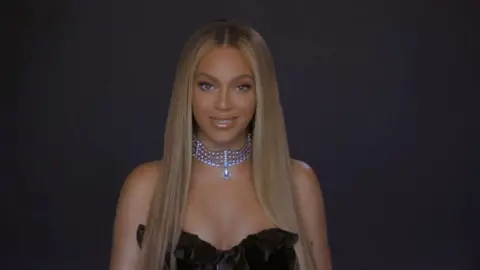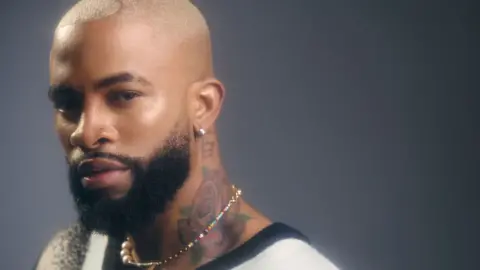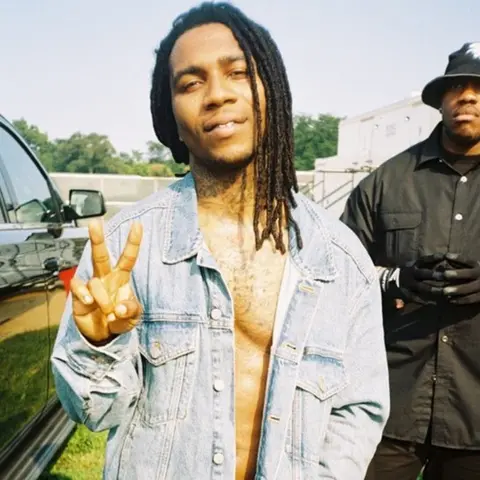George Floyd: The wave of protest songs sparked by his death
 Braden Lee
Braden LeeIn the weeks after Derek Chauvin murdered George Floyd in Minneapolis on 25 May 2020, a wave of new protest songs washed over the world of music.
The likes of Beyonce, Rihanna and Cardi B used their platforms to encourage their followers to take action against police brutality and systemic racism.
Those who penned new material referencing George Floyd's death included H.E.R, Trey Songz, Keedron Bryant and Lil Baby. Many of the profits from these songs were donated to relevant charities and organisations.
'Black artists suffer and cry too'
For Dua Saleh, an artist based in Minneapolis, George Floyd's home city, the weeks around his death were "fraught with emotion".
Dua, who uses the pronouns they/them, says they don't feel a "responsibility" to release music in times of grief.
But they released body cast - a song they had recorded two years earlier - almost as soon as they heard about George Floyd's death.
"When I'm not too hurt or in too much pain, I want to extend a hand to my community," the 26-year-old said.
 Getty Images
Getty ImagesThey tell Radio 1 Newsbeat: "I don't think it's a responsibility to talk about these things.
"A lot of black artists are suffering and crying and thinking about how they themselves could be victim to the police, so I don't think anybody has to, I feel like it's something I'm called to."
When asked what it is about songs that resonate with people in a way that books and articles don't, Dua says it's about "touching people's souls".
"Music taps into a vulnerable state that people are too protective to unleash," they say.
"It's hard to provide solid facts to showcase how people are experiencing moments and music does something that's outside of statistics."
As well as raising awareness, Dua also wanted to support their local community so chose to donate all profits from body cast to an organisation called 846S, which offers mental health support to marginalised groups in Minnesota.
 Wardell Malloy
Wardell MalloyGeorge Floyd's death also gave new life to some old material.
Elijah Blake re-released his 2014 song, Hanging Tree, about Eric Garner, a 43-year-old African-American who was killed by a police officer who put him in a prohibited chokehold while arresting him.
Elijah tells Radio 1 Newsbeat the song became "more relevant" after George Floyd's killing.
"When I re-released it, it felt good," he says.
"To watch people on marches playing Hanging Tree from their boom-boxes is worth far more than 10 million streams, that's really what the song was for."
Elijah says since 2014 he's noticed the music industry become more vocal when it comes to speaking out about racism.
"It's been too silent in the past because it's scary, you don't want to offend the wrong people, but that's not art. Art is for risk-takers and for people who stand for something."
"Now we're seeing artists who don't usually shake the table, take a stance. It's breathtaking to see our platform being used the right way".
'I Am George Floyd'
Despite normally staying away from political and historical messages in his music, Californian-based rapper Lil B tells Newsbeat he felt he "needed to do something".
"I'd seen the George Floyd video and I'd heard all the outcries," he says.
"It was only right to write about all these black people who lost their lives due to police brutality."
In the seven-minute track, called I Am George Floyd, Lil B lists names of black people who have been victims of police brutality.
"I wrote 'I am George Floyd', I wrote 'I am Sandra Bland' and in reality I am," he says.
"Obviously we're all individuals, but when I go outside if you don't know who I am, I am Sandra Bland."
 Lil B
Lil BWhen asked why George Floyd's death prompted so many artists to release new music, Lil B, whose real name is Brandon Christopher McCartney, says he believes it's linked to the video footage of Floyd's death - which went viral.
"When you heard him screaming on the ground and talking about his mother… you're looking at him saying that could be my uncle, cousin, brother or someone in the community," he says.
"He was crying for his life to be saved and that outcry is why artists really got creative with this.
"Everybody felt it and that's why there's momentum with George Floyd's death."


